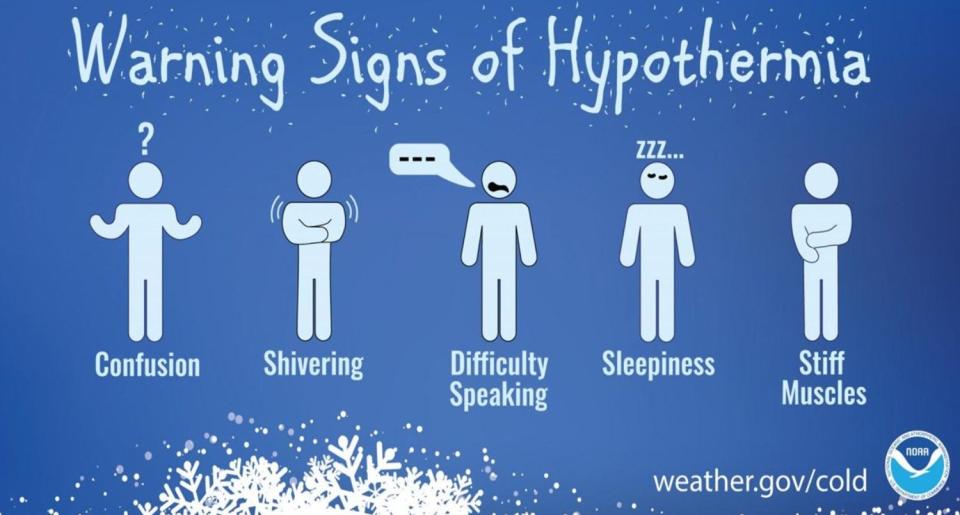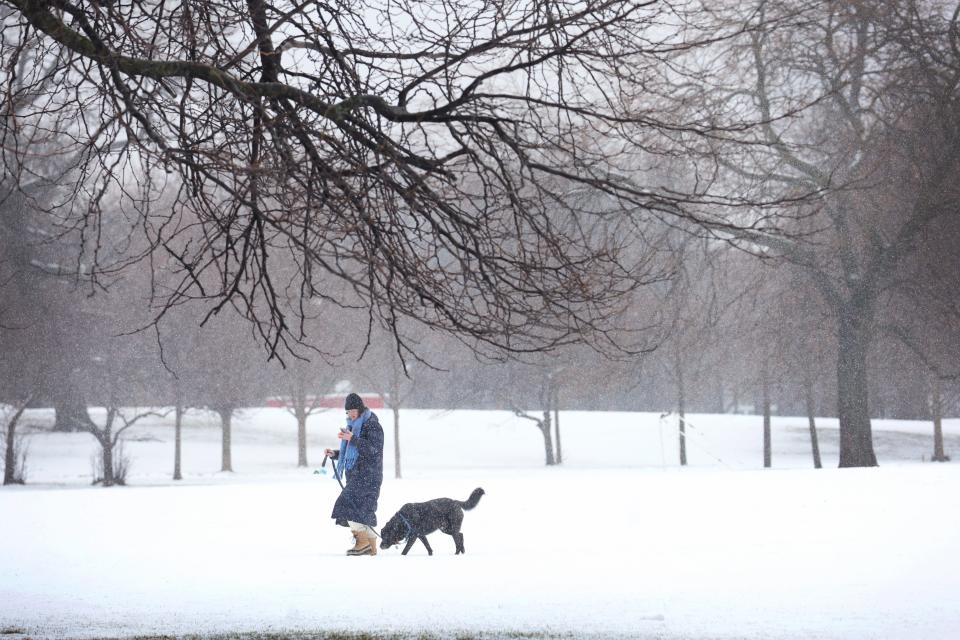How to stay safe when record cold temperatures hit New England
An Arctic blast is set to descend on New England this weekend, one that experts are warning could be the region's coldest in years. People are urged to prepare for the chilling temperatures and strong winds that can affect home heating, health, travel and power.
AccuWeather meteorologists say the "extreme" single-digit numbers will produce "extraordinary" real-feel temperatures "and challenge several long-standing record-low temperatures."
Real-feel temperatures could range between 30 and 50 below zero throughout New England on Friday night, according to AccuWeather, and mountains and ski resorts could be near 60 below zero.
Here are some things to know about staying safe amid the arctic blast and cold temperatures in general.
What is hypothermia and how can I get it?
Hypothermia occurs when your body loses heat faster than it can produce heat, causing a dangerously low body temperature, according to the Mayo Clinic. While a normal body temperature is around 98.6 F, hypothermia occurs when the body temperature falls below 95 F.
People can get hypothermia from exposure to very cold weather or submersion in cold water. Hypothermia can lead to death if left untreated, as the heart, nervous system and other organs won't work properly.
Frostbite? Hypothermia? How to stay safe and warm as extreme temperatures stun the USA

What is frostbite and how can I get it?
Frostbite occurs when freezing temperatures damage areas of the skin and tissues underneath. Mild cases can be treated with gradual warming, but severe cases require immediate medical attention.
Early symptoms may include skin turning a pale yellow or white, and it may itch, sting, burn or feel like "pins and needles." In an advanced stage, frostbite turns skin hard and cold to the touch, and the color of the skin darkens to a blue or black.
In extremely cold temperatures, people are encouraged to limit outdoor time. If you have to be outside, wear layers and cover all exposed skin. Try to stay dry and avoid sweating.
'Dangerously cold' weather forecast:Arctic chill headed for Cape Cod this weekend
When is it safe to walk your pet in cold weather?
In bitterly cold temperatures, pets should see limited outdoor time and outdoor pets should be brought inside.
For dogs, their cold tolerance is largely dependent on their breed. Temperatures in the 20s can put certain dogs at serious risk of frostbite and hypothermia. Dog owners are encouraged to limit walks to 15 minutes or less when temperatures fall below freezing.
The American Humane Society provides a tip sheet about keeping pets safe in cold weather. "If it’s too cold for you to stand outside, it is probably also too cold for your pets," the society says.
Pets and cold weather:When is it too cold for your pet to be outside? 4 tips to keep your pets safe this winter

Space heater safety amid cold temperatures
If not used properly and safely, space heaters can lead to fires. The U.S. Consumer Product Safety Commission estimates that space heaters, including both fixed and portable heaters, are associated with about 21,800 residential fires per year and 300 deaths.
Space heaters:7 tips for safely using a space heater in your home
In a press release this week, Massachusetts State Fire Marshal Peter Ostroskey urged people to keep space heaters at least three feet away from curtains, bedding and anything else that can burn. Plug them directly into a wall socket, he said, not an extension cord or power strip. Always turn a space heater off when you leave a room or go to sleep.
A space heater should also be placed on a hard, level, nonflammable surface.
Winter travel: What you should have in your car during cold weather
For people who expect to be on the road during very cold temperatures, you and your vehicle should be prepared. Make sure to have a full tank of gas and check your tires, as cold temperatures can lower tire pressure.
Emergency shelter:Burlington, VT creates temporary emergency night shelter in response to extreme cold
Your vehicle should be equipped with an emergency preparedness kit, including the following: jumper cables, flashlight, extra batteries, basic first-aid supplies, blanket and warm clothing, battery-powered radio, toolkit, bottled water and non-perishable food, safety flares and a windshield ice scraper.
Drivers are also encouraged to map out potential places to stop along their route − somewhere they can safely pull off the road to take a break or spend the night.
This article originally appeared on USA TODAY NETWORK: Cold weather safety tips as arctic blast hits New England

